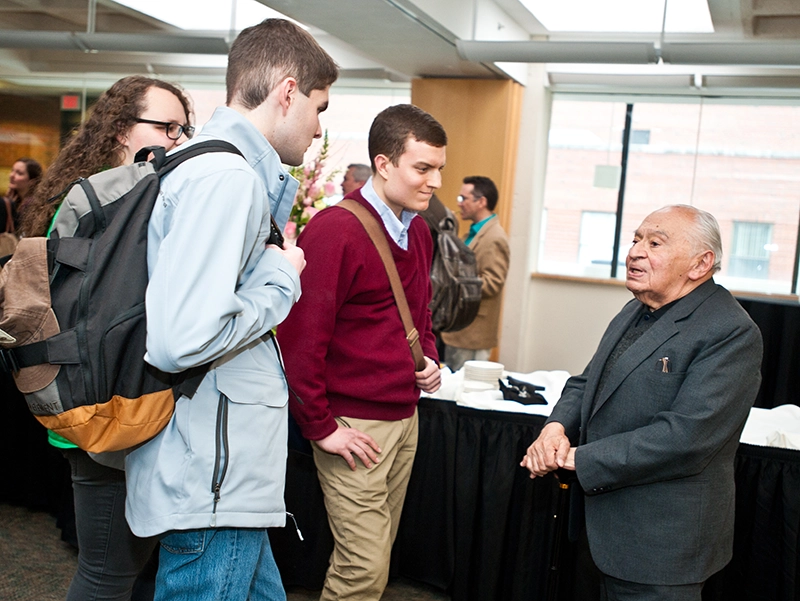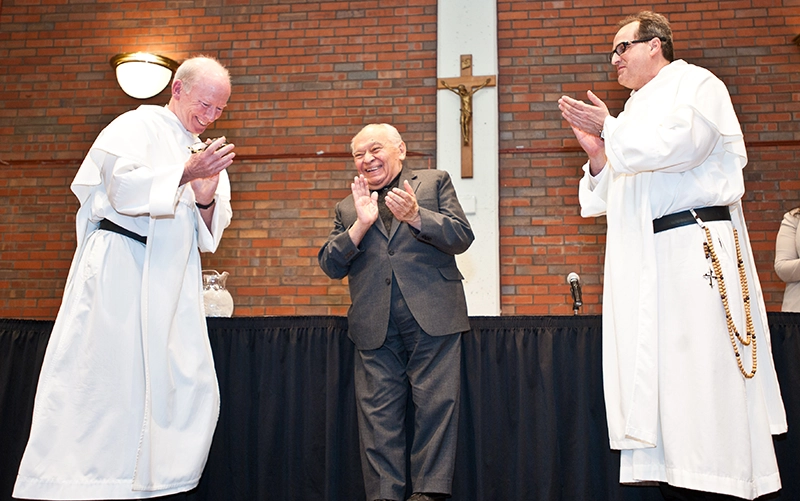Eminent theologian Rev. Gustavo Gutiérrez, O.P. ’15Hon. was a friend of the poor and marginalized
By Michael Hagan ’15, ’19G
“Poverty poses a major challenge to every Christian conscience and therefore to theology as well.”
Father Gutiérrez
Rev. Gustavo Gutiérrez, O.P. ’15Hon., the Dominican friar and theologian whose foundational contributions to the field of liberation theology led Providence College to award him an honorary doctor of divinity degree, died on October 22, 2024, in Lima, Peru. He was 96.
Father Gutiérrez visited Providence College in 2015 to present the Rev. Edward Cleary, O.P. Memorial Lecture and to receive his honorary degree.
Ordained a priest in 1959, he studied with some of the most influential Catholic theologians of the 20th century, among them Dominican friars Yves Congar and Marie Dominique Chenu. His groundbreaking scholarship forced Catholic theological authorities concentrated in the Vatican and other European and North American institutions to reckon with the experiences of the church in Latin America and beyond. He joined the Dominican Order in 2001.

Father Gutiérrez lived and traveled abroad during his 65-year priestly ministry and academic career, but he was most at home among the poor and marginalized of Lima, where he founded and directed the Bartolomé de las Casas Institute to minister to their needs in addition to serving as a priest.
Rev. David Orique, O.P., professor of history and director of the college’s Latin American and Latina/o Studies Program, has long studied Father Gutiérrez and liberation theology as part of a broader study of Christianity in Latin America. When Father Orique introduces liberation theology to students, he points to the movement’s scriptural foundations. “The Spirit of the Lord is upon me, because he has anointed me to bring glad tidings to the poor. He has sent me to proclaim liberty to captives and recovery of sight to the blind, to let the oppressed go free, and to proclaim a year acceptable to the Lord,” Jesus reads from the Prophet Isaiah at the beginning of his public ministry in the Gospel of Luke.
Father Orique, who knew Father Gutiérrez personally, said liberation theology is rooted in the commands of God, the words of the prophets, and the teachings and ministry of Jesus. It is a hopeful response to Jesus’ teaching, “Amen, I say to you, whatever you did for one of these least brothers or sisters of mine, you did for me.”
“Hoping is not waiting; rather it should lead us actively to resolve to forge reasons for hope,” Father Gutiérrez wrote.
Father Gutiérrez hoped in the promise of heaven but was scandalized by poverty and oppression afflicting God’s people in his native Peru and around the world. He taught that walking in the footsteps of Jesus necessarily “implies leaving the road one is on,” like the Good Samaritan who halts his own journey to rescue the man left naked and half-dead by robbers on the side of the road.
From the conviction that neglect for the suffering and powerless is sin and from his own experiences among the poor, Father Gutiérrez articulated “A Theology of Liberation” — the title of his seminal 1971 book frequently assigned as a course text at Providence College and around the world. Its call to solidarity inseparable from true friendship with the suffering — “a commitment to specific people” — offered a proximate starting point to students struggling to see a vast, complicated, and interconnected world through the eyes of Jesus.

The call was no less relevant in 2015 when Father Gutiérrez addressed hundreds of students, faculty, staff, and alumni at the Cleary Lecture in a standing-room-only ’64 Hall. It was there that he received his honorary degree, conferred by his Dominican brother Rev. Brian J. Shanley, O.P. ’80, then college president.
Challenges to social and political order as well as theological convention in and arising from Father Gutiérrez’s thought met suspicion within and beyond the Roman Catholic Church. For critics and proponents alike, the term “liberation theology” sometimes connotes social and political ideas extraneous to his thought. Nonetheless, Father Gutiérrez’s concept of the preferential option for the poor rooted in scripture has become a core principle of Catholic social teaching.
“There was a dialogue … sometimes a very critical dialogue. Indeed, certain moments were difficult, but we were never condemned,” Father Gutiérrez said regarding scrutiny from the Vatican.
When Father Orique was a doctoral student at the University of Oregon, Father Gutiérrez spoke on campus and stayed with the small Dominican community nearby. While preparing breakfast one morning, Father Orique asked Father Gutiérrez what it was like to have his theology questioned at the Vatican during the papacy of Pope St. John Paul II and at a time when Cardinal Joseph Ratzinger, the future Pope Benedict XVI, led the Vatican office enforcing doctrine.
According to Father Orique, Father Gutiérrez responded: “David, any good scholar is willing to have his work critiqued. The experience helped me to be a better theologian. At the end of our visit, the pope gave me a hug and told me to keep up the good work.”
After breakfast, Father Gutiérrez insisted he wash the dishes himself, Father Orique said.
Father Gutiérrez preached equality in the infinite love of God that entitles the poor and oppressed to the same dignity and self-determination as the powerful. “The goal is not to become … the ‘voice of the voiceless’ … but rather in some way to help ensure that those without a voice find one. Being an agent of one’s own history is for all people an expression of freedom and dignity,” he wrote.
“Gustavo’s humility and humanity come from his personal suffering and from walking with people who suffer. He was one of the most humble and holy people I have ever met,” Father Orique said.





